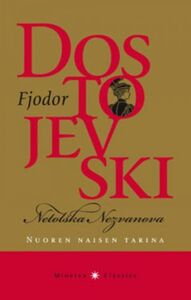Take a photo of a barcode or cover
Early work, interrupted by prison in Siberia.
Child’s-eye-view is hard to do well, and now I read this again, I wonder why D. decided to write as a young girl, which he never did later on (unless there is a story I haven’t read). He likes to write children later on, but these are boys – although they always have sisters. He writes women who stand for me with George Eliot’s Dorothea and Turgenev’s several women mains, as actual 19th-century-written women who were real and significant to me. Maybe, post-Siberia, he thought he’d better pull his head in and write what he knows. But this is one of the rare few books that talk to me about my childhood. Uncomfortably so, in the child’s favouritism between her parents (she took her father’s side, quite unfairly); strangely so, in his rendition of a girls’ romance. Because romances happen before sexuality or aside from it. The child’s passions for her father and then her friend were true to childhood as I knew it, if over-written by the lights of a 20th-century style. Childhood friendships, how important they were to me as a girl – more intense than adult friendships – are the part of my life I feel underrepresented in fiction, so I grabbed onto this. The child’s moral quandaries seem unusual in fiction too – I thought of Little Dorrit, this time around, but am tempted to maintain Netochka is given more moral agency, at a very young age. I think this is right; at least, the novel mattered to me for it.
I haven’t talked about Efimov, the frustrated musician with a self-defeating personality; but then others do. He was striking, and has an afterlife in later work – not the musicianship so much, and I enjoyed D. hanging out with artists; I can wish he had done more of that too.
From Joseph Frank, [b:Dostoevsky: The Seeds of Revolt, 1821-1849|434860|Dostoevsky The Seeds of Revolt, 1821-1849|Joseph Frank|https://d.gr-assets.com/books/1348019431s/434860.jpg|423793], I learn: most speculate that Netochka was to become a great singer (not the sort of plot D. ever did later); he was heavily influenced by George Sand at the time. Frank has a good few pages on Netochka, context and what his aims might have been; anyway, this to me, pre-Siberia, was the most interesting volume of Frank’s five, told me most about him.
Child’s-eye-view is hard to do well, and now I read this again, I wonder why D. decided to write as a young girl, which he never did later on (unless there is a story I haven’t read). He likes to write children later on, but these are boys – although they always have sisters. He writes women who stand for me with George Eliot’s Dorothea and Turgenev’s several women mains, as actual 19th-century-written women who were real and significant to me. Maybe, post-Siberia, he thought he’d better pull his head in and write what he knows. But this is one of the rare few books that talk to me about my childhood. Uncomfortably so, in the child’s favouritism between her parents (she took her father’s side, quite unfairly); strangely so, in his rendition of a girls’ romance. Because romances happen before sexuality or aside from it. The child’s passions for her father and then her friend were true to childhood as I knew it, if over-written by the lights of a 20th-century style. Childhood friendships, how important they were to me as a girl – more intense than adult friendships – are the part of my life I feel underrepresented in fiction, so I grabbed onto this. The child’s moral quandaries seem unusual in fiction too – I thought of Little Dorrit, this time around, but am tempted to maintain Netochka is given more moral agency, at a very young age. I think this is right; at least, the novel mattered to me for it.
I haven’t talked about Efimov, the frustrated musician with a self-defeating personality; but then others do. He was striking, and has an afterlife in later work – not the musicianship so much, and I enjoyed D. hanging out with artists; I can wish he had done more of that too.
From Joseph Frank, [b:Dostoevsky: The Seeds of Revolt, 1821-1849|434860|Dostoevsky The Seeds of Revolt, 1821-1849|Joseph Frank|https://d.gr-assets.com/books/1348019431s/434860.jpg|423793], I learn: most speculate that Netochka was to become a great singer (not the sort of plot D. ever did later); he was heavily influenced by George Sand at the time. Frank has a good few pages on Netochka, context and what his aims might have been; anyway, this to me, pre-Siberia, was the most interesting volume of Frank’s five, told me most about him.

